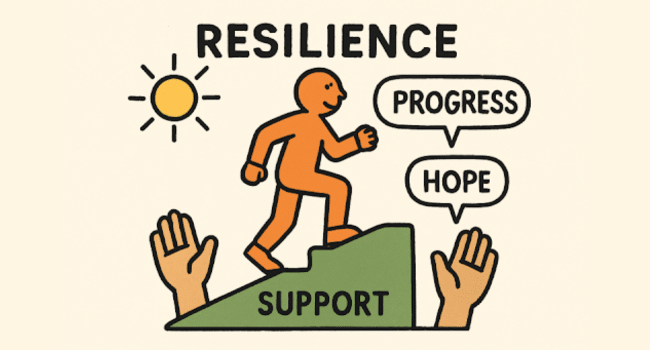Table of Contents
What Is Resilience?
Resilience is the capacity to adapt, recover, and thrive despite setbacks, trauma, or stress. It’s not an inborn trait but a learnable process combining emotional flexibility, creative problem-solving, and helpful habits. When building a foundation for recovery, resilience becomes the critical engine enabling individuals to move forward even when progress feels challenging. At Villa Kali Ma, recovery programs help participants grow this vital trait through a holistic blend of professional support and practical tools.
Modern research highlights that resilient people are not exempt from life’s difficulties; instead, they develop a toolkit for navigating tough moments, transforming them into opportunities for self-growth and renewed purpose. By learning to approach hardship with openness and adaptability, anyone can foster the resilience needed for lasting recovery.
Why Resilience Matters in Recovery
Resilience is crucial in recovery from mental health challenges, addiction, or trauma, as it helps individuals bounce back from relapses, navigate triggers, and maintain hope. According to the American Psychological Association, resilient thinking can reduce the likelihood of relapses and promote healthier long-term outcomes. Resilient individuals process difficult feelings, identify practical solutions, and seek support when needed, which is especially important in recovery, where emotional highs and lows can be intense and unpredictable.
Foundational Strategies for Building Resilience
Building resilience is a gradual process shaped by daily choices and positive coping mechanisms. Key foundational strategies include:
- Practicing Self-Awareness: Noticing internal reactions and common triggers allows individuals to manage thoughts and behaviors before they spiral.
- Developing Consistent Routines: Regular sleep, nutritious meals, and scheduled exercise help stabilize mood and energy levels.
- Celebrating Achievements: Setting realistic goals and acknowledging progress, no matter how small, cultivates a sense of accomplishment and motivation.
- Maintaining Optimism: Focusing on hope, gratitude, and positive reframing enables resilience even in the toughest moments.
The American Psychological Association has noted strong empirical support for these methods. Over time, these intentional strategies weave together to create a safety net that supports recovery at every stage.
Managing Stress and Setbacks
Stress is an inevitable part of recovery, especially during early phases when new habits are still developing. Managing stress doesn’t mean avoiding it altogether; rather, it’s about responding skillfully. Helpful approaches include:
- Reframing setbacks as learning experiences rather than failures
- Engaging in mindfulness techniques such as guided breathing or body scans
- Seeking timely support from a mentor, support group, or counselor
Stress management empowers individuals to stay grounded during turbulent times, reducing the likelihood that temporary setbacks derail overall progress.
Practical Everyday Habits
Establishing small daily routines lays the groundwork for a resilient life. Several low-barrier habits shown to enhance resilience include:
- Journaling: Documenting daily thoughts, struggles, and victories allows for reflection and self-celebration.
- Movement: Activities like yoga, walking, or stretching are proven to reduce anxiety and improve mental clarity.
- Leisure Activities: Engaging in creative pursuits, taking nature walks, or listening to music can recharge the mind and body.
- Practicing Gratitude: Writing down three things you’re grateful for each day builds a positive perspective.
Integrating these habits is accessible and doesn’t require specialized equipment or expert supervision, making resilience-building a part of everyday life.
The Role of Support Systems
Human connection is a cornerstone of resilience and recovery. Reliable support networks—whether composed of friends, family, recovery peers, or professionals—create a safety net encouraging honesty, accountability, and shared wisdom. Group therapy sessions, online recovery communities, and peer-led meetings all offer valuable spaces for mutual encouragement and learning. Studies published by Psychology Today show that recovering individuals with social support experience lower relapse rates and greater emotional stability.
Turning Resilience Into a Lifelong Strength
Resilience is more than just a skill—it’s the steady, guiding force that transforms recovery from a fragile hope into a sustainable way of life. By practicing daily habits, managing stress with intention, and leaning on strong support systems, individuals can face challenges without losing momentum. Each setback becomes an opportunity to learn, each achievement a reminder of progress made. Backed by research and real-life success stories, resilience proves that the absence of hardship does not define recovery, but by the capacity to rise stronger after each challenge does. With dedication, community, and a commitment to growth, resilience can become a lifelong strength that empowers lasting healing and fulfillment.
